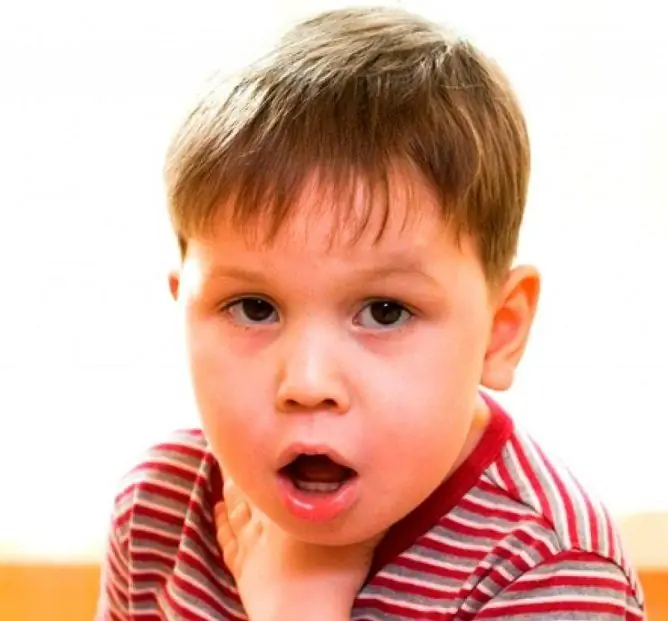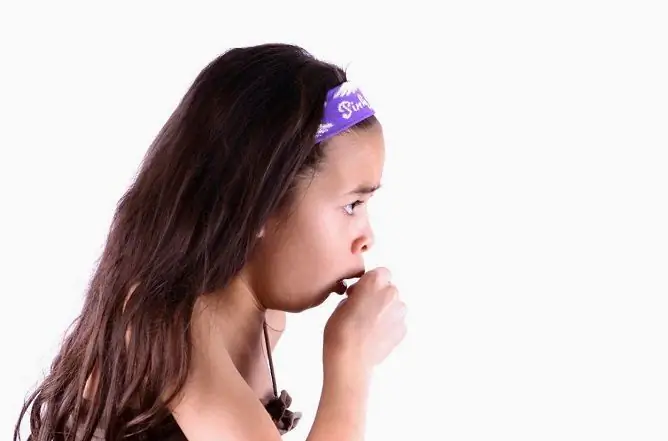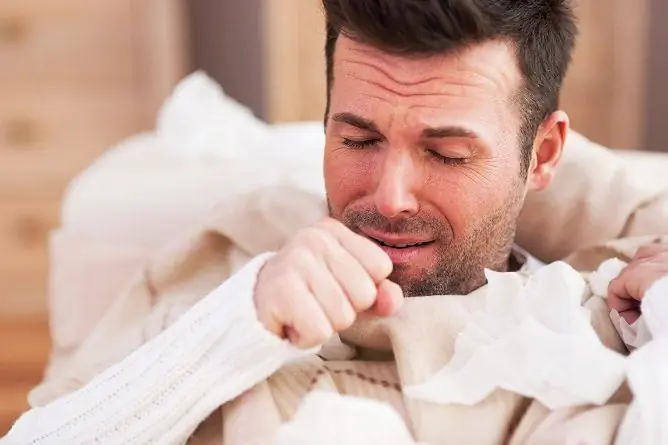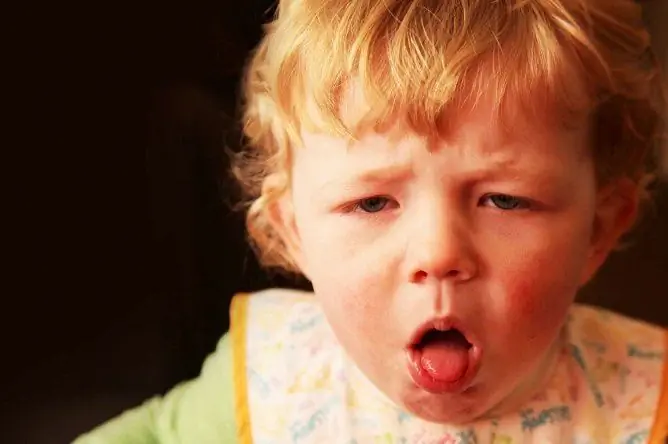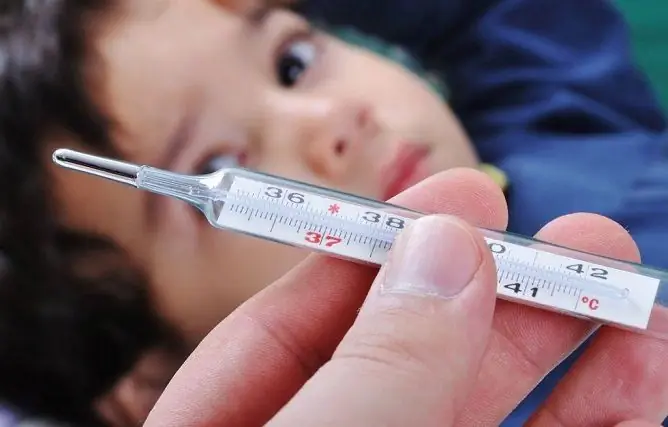- Author Rachel Wainwright wainwright@abchealthonline.com.
- Public 2023-12-15 07:39.
- Last modified 2025-11-02 20:14.
How to treat a cough in infants without fever and with fever
The content of the article:
- Cough in a newborn and baby: types and causes
- How to treat a cough in infants without fever and with fever
- Traditional methods of cough treatment
- Video
A cough in a baby is a protective reaction of the body, which is aimed at cleansing the respiratory tract of mucus, microorganisms, and dust particles that have accumulated in them. Irritation of nerve receptors located in the mucous membrane of the respiratory tract leads to the occurrence of a cough act. From here, irritation along the nerve fibers is transmitted to the cough center of the medulla oblongata, which gives the command for the simultaneous contraction of different muscle groups, which provide a sharp exhalation through the mouth, that is, a cough jolt. At the same time, the air stream rushes outward with force and carries with it phlegm, microbes and dust accumulated in the respiratory tract.

There are many causes of cough in infants.
Cough in a newborn and baby: types and causes
In babies of the first year of life, coughing is most often caused by infection with viruses and pathogenic bacteria.
A painful and obsessive dry cough, in which there is a slight discharge of sputum, is most often observed against the background of ARVI.
With tracheitis, the cough is deaf and rough.
Inflammation of the larynx (laryngitis) is accompanied by the appearance of a paroxysmal dry barking cough. Its occurrence is a serious symptom, indicating the possible development of false croup - an attack of suffocation associated with rapidly increasing swelling of the mucous membrane of the upper respiratory tract.
Often, a child of the first months of life coughs in the morning against the background of a runny nose. The reason for the occurrence of such a cough is due to the fact that during sleep, mucus from the nose enters the lower parts of the airways, waking up, the baby tries to cough it up. That is, in this case, cough should be considered as a physiological act.
At the very onset of respiratory tract diseases, the cough is usually dry. But after a few days it begins to gradually turn into moist. Any deterioration in the child's condition during this period should alert the parents and become the reason for the mandatory visit to the doctor, if this has not been done earlier.
An infectious disease such as whooping cough can also cause a cough. With this disease, the cough is dry, its attacks often occur at night. Cough tremors are interrupted by a reprise - a convulsive whistling breath. The child's face turns red, and tears appear in his eyes. Vomiting may occur at the end of the attack.
A sudden strong attack of dry cough may indicate that foreign objects (small toy, button, piece of food) have entered the respiratory tract. In this case, you must immediately seek medical help, as this condition can be complicated by suffocation, the development of bronchitis or pneumonia.
Another cause of cough in infants is often allergies. Therefore, it is recommended to use specially designed products for caring for a child, and also to refuse to use any aerosols (deodorants, hair sprays, eau de toilette) in the baby's room.
Thus, the causes of a cough in a child can be very different. Only a doctor can understand each specific situation. In this regard, when a cough appears, even at normal body temperature, parents should immediately call a pediatrician from the clinic to the house.
How to treat a cough in infants without fever and with fever
As mentioned above, a cough is just a symptom inherent in a particular pathology. Therefore, therapy should be aimed at eliminating the cause that caused it. Parents should be aware that the treatment of cough in an infant should only be carried out by a doctor. At the same time, there are a number of general measures to alleviate the condition of a sick child and reduce cough:
- Humidification of the air in the room. Dry air causes dryness of the mucous membranes of the respiratory tract and thereby provokes the onset of coughing fits. Therefore, doctors recommend that the air temperature in the child's room should not exceed 22-24 ° C. For humidification, it is best to use special humidifier devices. If there is no such device, then it is recommended to put a basin of water in the room or hang wet diapers on a hot battery.
- Drink plenty of fluids. During illness, it is necessary to increase the amount of fluid consumed by the baby. He can be given warm boiled water, children's herbal teas. Drinking plenty of water helps to reduce the manifestations of intoxication (weakness, fever, lack of appetite) and liquefies phlegm.
- Vibration massage. Babies in their first year of life cannot effectively cough up phlegm. To facilitate this process, vibration massage is performed - light tapping movements with the palms of the chest. The procedure should be performed no more than 3-5 minutes 3-4 times a day.
With a dry cough, when the sputum is not separated at all or is separated with great difficulty, the doctor may prescribe mucolytics - drugs to dilute sputum and make it easier to cough up. They are available for children in the form of drops or syrup, which is convenient for both dispensing and for use by the baby. As soon as the cough becomes wet, mucolytics are canceled.
With a strong dry cough in a short course, the doctor may prescribe antitussives, the action of which is aimed at suppressing the cough reflex. These medicines should not be taken at the same time as mucolytics.

All medicines are given to young children strictly according to the doctor's prescription.
Antihistamines for coughing in babies are used only if there are signs of allergies and at a high risk of developing false croup.
Whether it is necessary to include antibiotics in the cough therapy regimen can only be decided by a doctor. Indications for their appointment are bacterial respiratory tract infections. But sometimes (strictly according to indications) antibiotics are prescribed for viral diseases in order to prevent the addition of a secondary infection.
Traditional methods of cough treatment
Modern medicines prescribed by a doctor can quickly and effectively cure a cough. However, some parents, when their baby wakes up from a cough, prefer to treat it with folk remedies. Is this approach justified? Of course not. Most of the methods recommended by traditional medicine for the treatment of cough may not be beneficial, but harm to the baby.
Children of the first half of life, for example, are contraindicated for any irritating agents, including marshmallow root. They enhance the gag reflex, due to which the child has more frequent regurgitation. Also, these drugs are contraindicated in babies with perinatal encephalopathy, as they stimulate the processes of excitation in the cerebral cortex.
Until the child reaches 6 months of age, it is not recommended to do chest rubbing. In the future, this method of cough treatment can only be used as part of complex therapy. At the same time, parents should know that children of the first years should not be rubbed with agents that include camphor.
You should not carry out babies and steam inhalation. Hot steam can burn their delicate mucous membranes, intensify coughing or choke.
In conclusion, I would like to emphasize once again that there is not a single universal cure for cough. Therefore, you should not self-medicate, relying on the advice of a pharmacist, family or friends. If your child suddenly begins to cough, you need to see a doctor who will conduct an examination, make the correct diagnosis and prescribe the treatment required in this particular situation.
Video
We offer for viewing a video on the topic of the article.

Elena Minkina Doctor anesthesiologist-resuscitator About the author
Education: graduated from the Tashkent State Medical Institute, specializing in general medicine in 1991. Repeatedly passed refresher courses.
Work experience: anesthesiologist-resuscitator of the city maternity complex, resuscitator of the hemodialysis department.
Found a mistake in the text? Select it and press Ctrl + Enter.


